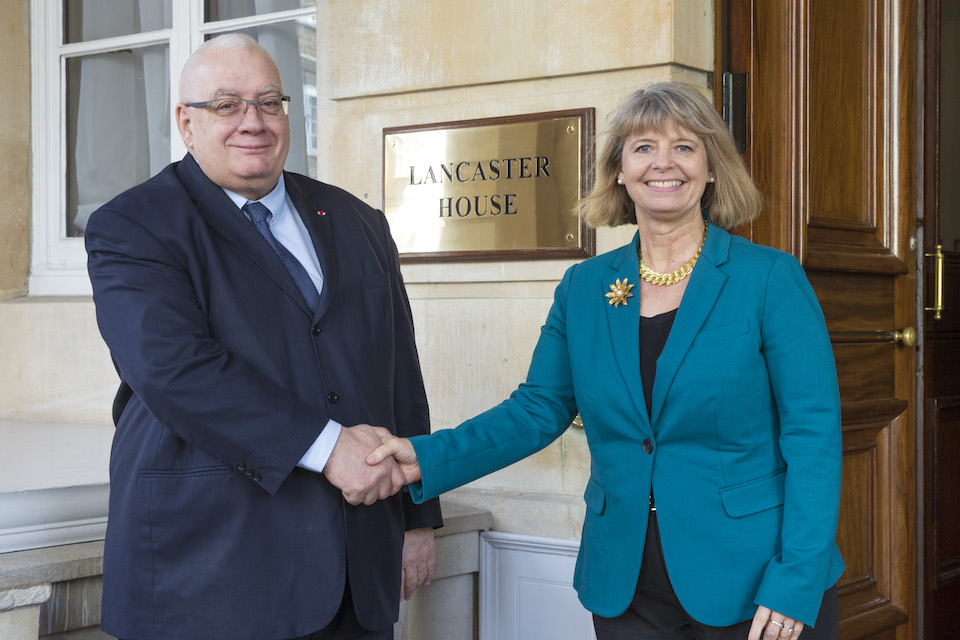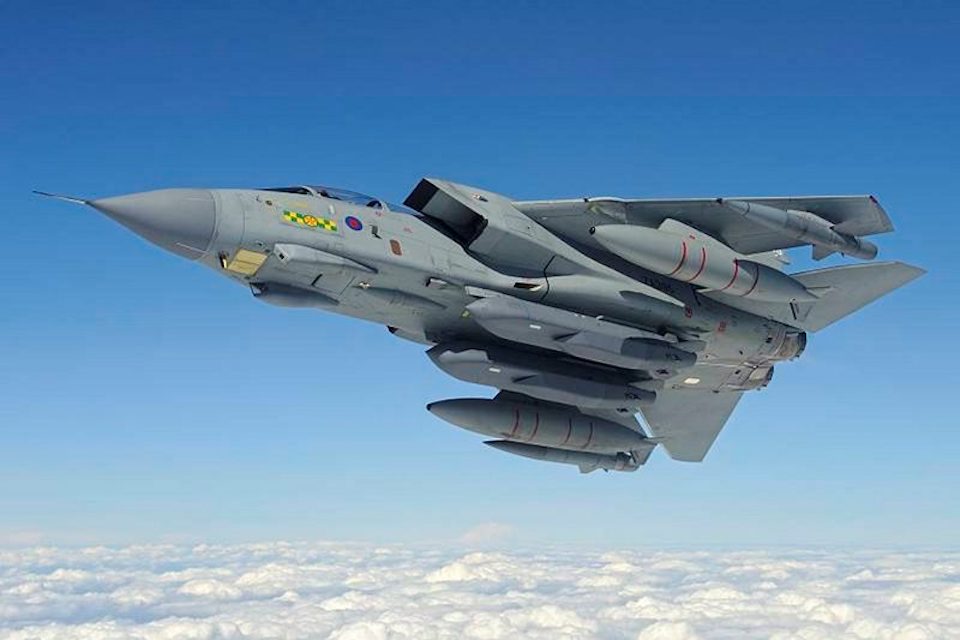Mr Speaker, I am grateful to the Right Honourable Member for North Belfast and his colleagues for bringing this motion to the House today and for initiating this very important debate.
So can I be clear from the outset.
Operation Banner, as the House is aware, lasted for nearly 30 years.
It was the longest single continuous deployment of the Armed Forces in British military history.
During that period over 250,000 people served.
The Armed Forces and the RUC combined lost over 1,000 men and women to terrorism. There were over 7,000 awards for bravery. And the Royal Ulster Constabulary was rightly awarded the George Cross.
So as this Government’s Northern Ireland manifesto at the last election made clear, “we salute the remarkable dedication and courage of the Royal Ulster Constabulary and our Armed Forces in defending the rule of law and in ensuring that the future of Northern Ireland would only ever be determined by democracy and consent.”
Quite simply without their contribution what we know today as the Northern Ireland peace process would never have happened.
All of us, across this House and throughout our United Kingdom, owe them a huge debt of gratitude.
Just as we owe them an enormous debt for the work and sacrifice they have made in other parts of the world referred to in the motion before us, in Kosovo, in Iraq and in Afghanistan.
Wherever they operate we quite rightly regard our Armed Forces as the best in the world.
The Government asks them to put their lives on the line in order to defend us and our way of life.
In return they rightly expect the fullest possible support from the Government.
And that is something that this Government, through my RHF the Defence Secretary and his colleagues, is determined to provide.
We will never accept any kind of spurious moral equivalence between those who sought to uphold the rule of law and the terrorists who sought to destroy it.
For us, politically motivated violence in Northern Ireland was never justified, whether it was carried out by republicans or loyalists.
We will continue to reject attempts to place the state at the heart of every atrocity or somehow to displace responsibility away from those who carried out terrorist attacks, namely the terrorists themselves.
And we will not accept attempts to denigrate the contribution of the security forces and seek to give any kind of legitimacy to violence.
But being the best in the world does mean operating to the very highest of standards. We expect nothing less and I know that our Armed Forces would not have it any other way.
As the Noble Lord Stirrup put it in a recent debate in the Other Place, “The need to act lawfully is not a side consideration for the Armed Forces; it is an integral part of the ethos and training.”
We believe in the rule of law and the police and Armed Forces are charged with upholding the law. They cannot operate above it or outside of it. Where there is evidence of criminality it should be investigated without fear or favour.
But in our view what characterised the overwhelming majority of those who served was discipline, integrity, restraint, professionalism and bravery.
And we should be proud of them.
Mr Speaker, as my Right Honourable Friend the Prime Minister also made clear in the House yesterday, it is also appalling when people try to make a business of dragging our brave troops through the courts.
In that context the motion before the House welcomes the Government’s decision to wind up the Iraq Historic Allegations Team following the Solicitors’ Disciplinary Tribunal hearing, and the consequent decision to strike off Phil Shiner.
This called into question the credibility of a large number of the IHAT’s remaining caseload … which will now revert to the Royal Navy Police.
To be clear, the Government has a legal obligation to ensure that criminal allegations against the Armed Forces are investigated.
But we also remain determined to ensure that our legal system is not abused … as it clearly was by Mr Shiner … falsely to impugn the reputation of our Armed Forces.
And we should all support the decisive action taken by my Right Honourable Friend the Defence Secretary in this case.
Mr Speaker, as many RH and HMs are well aware, addressing the legacy of the past has been one of the most difficult issues since the Belfast Agreement nearly 19 years ago.
What is clear today, as today’s debate highlights, is the current structures in place are simply not delivering for anyone, including victims and survivors on all sides who suffered most during the Troubles.
The rawness of the continuing pain and emotion of families and survivors is stark.
And yet the need to make progress in this area is clear.
The legacy of the past continues to cast a shadow over society in Northern Ireland.
It retains the ability to destabilise politics.
And it has the capacity to be used by those who wish to fuel division promote terrorism to achieve their objectives.
Of course people are always going to retain their own views on the past, which will be shaped by their own experiences of it.
I acknowledge that that the Government’s view of the troubles will not be shared by everyone and vice versa.
But where we should strive to reach consensus is on the structures needed to address it, and in a way that helps move Northern Ireland forward.
The inquest system was not designed to deal with highly-complex often linked cases involving large amounts of highly-sensitive material.
The Office of Police Ombudsman has to deal with historical allegations of misconduct rather than focusing on cases today.
The PSNI has to devote substantial resources to dealing with legacy cases when I know that they would prefer that it be spent on policing the present.
And taken as a whole, I recognise concerns that the current mechanisms focus disproportionately on cases involving, or allegedly involving, the state.
As a result leaving many victims of terrorism feeling ignored.
None of this is to criticise any individuals, not least the police and prosecuting authorities, all of whom uphold the law independently of government.
I support them in their difficult work.
Rather it is a recognition, which is widely accepted, that we need new and better structures for addressing these issues.
The status quo is not sustainable.
The Government has a duty to seek better outcomes for victims and survivors.
And we need legally robust mechanisms that enable us to comply with our international obligations to investigate criminal allegations.
The [Stormont House Agreement] was arrived at in December 2014 following eleven weeks of intensive cross party party talks with the UK Government, the five largest parties in the Northern Ireland Assembly and the Irish Government on matters falling within their responsibility.
The Agreement contained the most far reaching set of proposals yet for addressing the legacy of Northern Ireland’s troubled past … the Historical Investigations Unit, the Independent Commission for Information Retrieval, the Implementation and Reconciliation Group, and an Oral History Archive.
A number of different options were discussed during those talks.
Amnesties were quickly dismissed by all the participants and are not the policy of this Government.
We believe that the so called legacy bodies set out in the Stormont House Agreement continue to provide the most effective way to make progress on this hugely sensitive but hugely important issue.
Delivering the Stormont House Agreement, including the legacy bodies, and also reforming legacy inquests was a key Northern Ireland manifesto pledge for the Conservative Government at the last election.
And we remain committed to this.
But in doing that I am also committed to the need to ensure that former soldiers and police officers are not unfairly treated or disproportionately investigated.
That is why any legislation we bring forward will explicitly set out that all of these bodies, including the Historical Investigations Unit (HIU), will be under legal obligations to operate in ways that are fair, balanced and crucially proportionate.
Terrorists were responsible for 90 per cent of all deaths in the troubles and any investigative processes have to reflect that.
Its caseload will also contain some of the most notorious atrocities resulting in the deaths of our Armed Forces, such as at Warrenpoint in 1979 and Ballygawley in 1988.
The HIU will look at cases in chronological order, meaning that it will be unable prioritise cases involving the state above those involving terrorists.
Any legislation establishing the HIU would include specific tests which must be met in order that a previously completed case is reopened for investigation.
This will mean specifically that new and credible evidence that was not previously available to the authorities is needed before the HIU will re-open any closed case.
We are looking at ways of ensuring that where prosecutions do take place terrorists are not treated more favourably than former soldiers and police officers.
And the bodies will be time limited to five years, ensuring that this process will not be open ended thereby helping Northern Ireland to move forward.
Mr Speaker, turning the Stormont House Agreement into detailed legislation has been and continues to be a long and necessarily complex process.
But a great deal of progress has been made in building the consensus necessary to bring legislation before this House.
And I believe that with hard work on all sides the outstanding areas of disagreement are bridgeable.
In September, I signalled my intention to move the process to a more public phase.
I had hoped that this would have taken place by now, but a continuing lack of consensus and then the political situation at Stormont have delayed that from happening.
But I remain committed to giving the public a say on these proposed bodies – and to building confidence in them from across the community.
So I want to take that forward as soon as possible after the Northern Ireland Assembly election a week today, so that we can make progress quickly.
But any approach to the past must be fair, balanced and proportionate.
It must have victims and survivors at its heart.
And it must be consistent with our obligations to those who served and in too many cases sacrificed so much to bring about the relative peace and stability that Northern Ireland enjoys today.

